Our Early Learning Goals
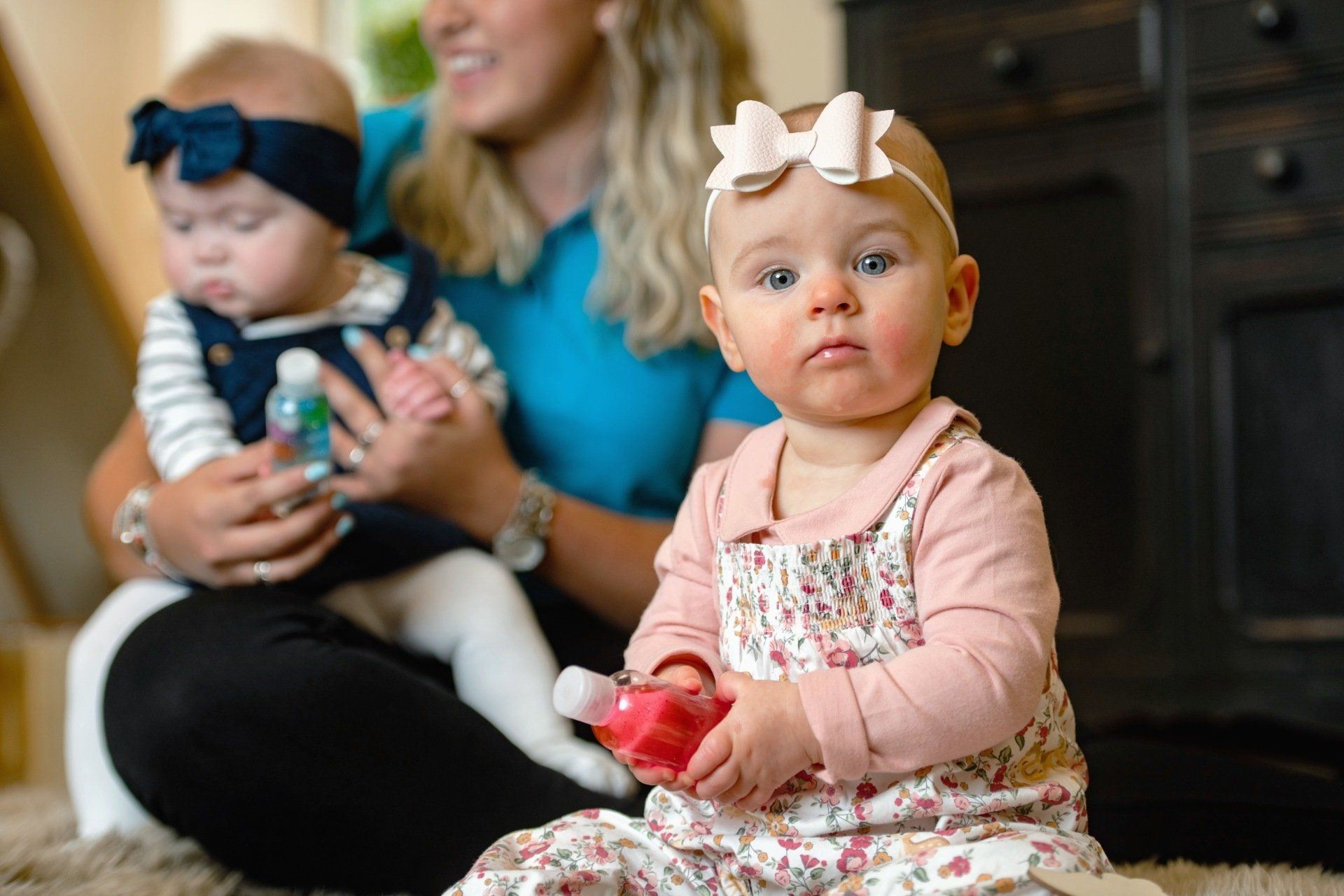
Personal, Social and Emotional Development -
During 0 - 11 months at nursery your child will learn how to create relationships, become aware of their self confidence and will learn how to manage their feelings and behaviour. A few of the things your child will start doing to show these are: gazing at faces, copying facial movements like sticking their tongue out or opening their mouth. They start to use their voices, gestures, eye contact and facial expressions to make contact with people and keep their attention. When learning how to manage feelings and behaviours they seek physical and emotional comfort by snuggling in to trusted adults.
Communication & Language -
Throughout nursery the children learn about communication and langauge, but during their first 11 months we focus on their listening and attention, their understanding and their speaking. They will start reacting to interactions with others by smiling, looking and moving around. The children start to understand their own name when called and also start to speak and communicate needs in different ways by crying, gurgling, babbling and squeeling.
Physical Development -
Moving and Handling, as well as Health and Care is something that focused on during their first 11 months. The children will gradually start to develop the ability to hold up their own head and will start to make movements with their arms and legs which gradually become more controlled. At this stage of their development they will start expressing discomfort, hunger or thirst as well responding to and thriving off warm, sensitive physical contact and care.
Literacy -
Reading and writing is another key stage in EYFS, here at nursery we start to focus on this from day 1 when they start looking at books and other printed materials with familiar people.
Mathematics -
As well as introducing literacy into the children's learning, we also introduce mathematics, learning about numbers, shapes, space and measurements, all through PLAY! The children love 'peek a boo' and other hiding games.
Understanding the World -
This part of the childrens learning and development is so that they can understand their physical world, to explore and observe, finding out about people, places, technology and the environment around them. The children start to recognise more around them and smile with pleasure when seeing familiar things around nursery.
Expressive Arts & Design -
Here at Country Kids we are very passionate about enabling the children to learn through play, introducing arts and design at this age allows them to express thoughts, feelings and ideas in a variety of different ways. Allowing them to be imaginative through art, music, dance, design and role play.
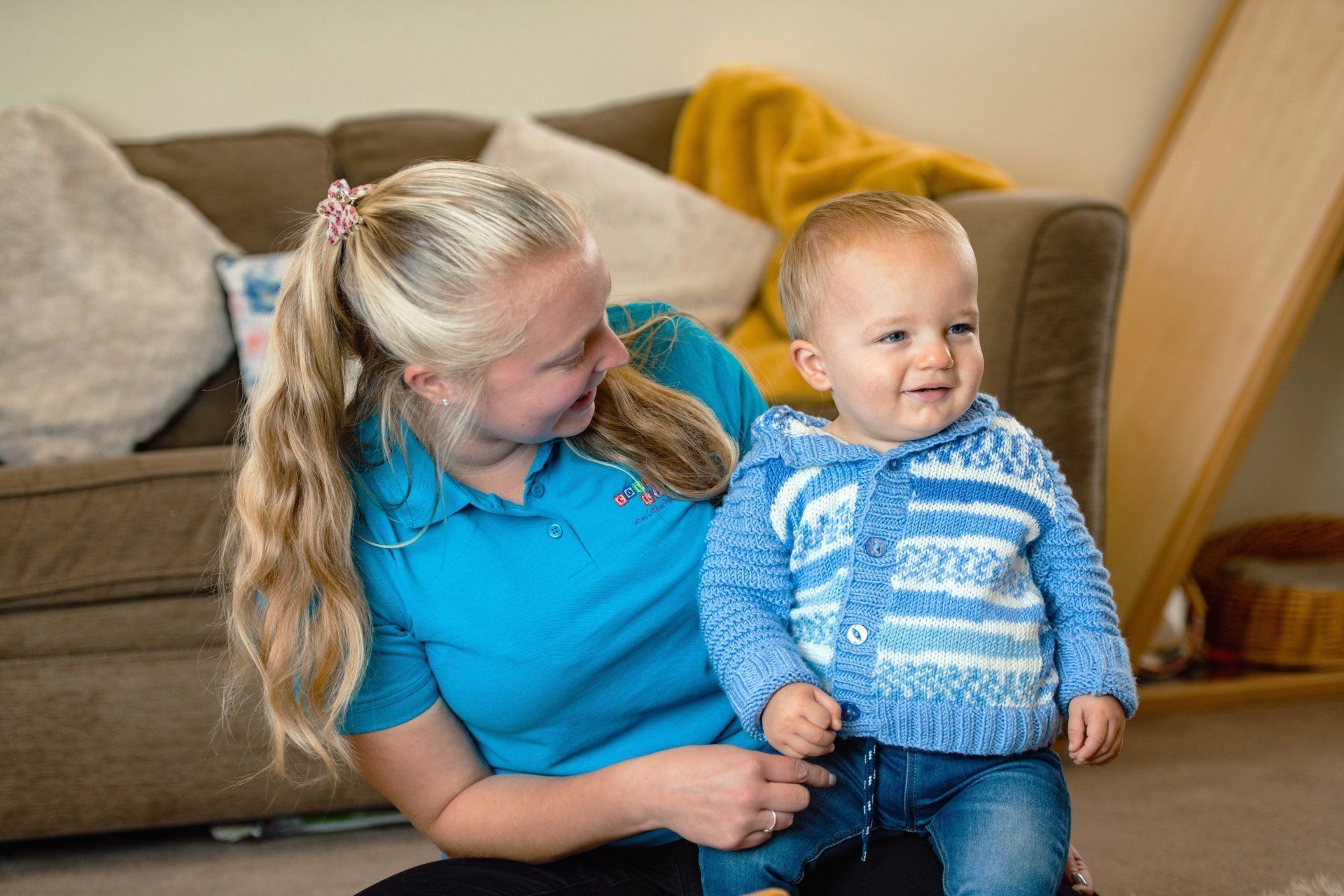
Personal, Social and Emotional Development -
Your child will now start to form positive relationships with others at nursery, showing respect, developing new skills and learning how to manage their feelings and behaviours. Between the age of 8 - 20 months they start to draw others attention for social interaction, become wary of unfamiliar people and starts to become more familiar with their nose, eyes and tummy as part of a naming game.
Communication & Language -
Communication and language is important for us to focus on as it develops their confidence and allows them to express themselves. Between the age of 8 - 20 months they will start to move their bodies to sounds and music they enjoy, their understanding of single words in context will develop, ie. 'cup', 'milk' and 'daddy', and they will also start to use sounds during play, like 'brum' when playing with a toy car.
Physical Development -
Physical Development provides the children with opportunities to develop their co-ordination, control and movement. During this stage the children will be able to sit on the floor unsupported, enjoy the sensory experience of making marks in sand, paste or paint. They will become aware of their control and movement by opening their mouth for a spoon and holding their own bottle and cup.
Literacy -
Literacy is a key factor in development to encourage them to begin to read and write. At the ages of 8 - 20 months they become more interested in books and printed material .
Mathematics -
Throughout the age of 8 - 20 months at nursery your child will develop an awareness of numbers through rhymes and songs that relate to numbers and will start getting to know and enjoy their daily routines, such as getting up time, mealtimes, nappy time and bedtime - also having an understanding of their surroundings.
Understanding the World -
The older they get the more they will learn about the world and their surroundings, but at this stage of their development you'll notice them observing animals, people and vehicles around them.
Expressive Arts & Design -
Here at Country Kids we are very passionate about enabling the children to learn through play. At nursery we use a range of sensory toys, activities and games to explore and experiment. This is their time to be imaginative... they start to imitate and improvise actions they have seen others do, like clapping or waving.
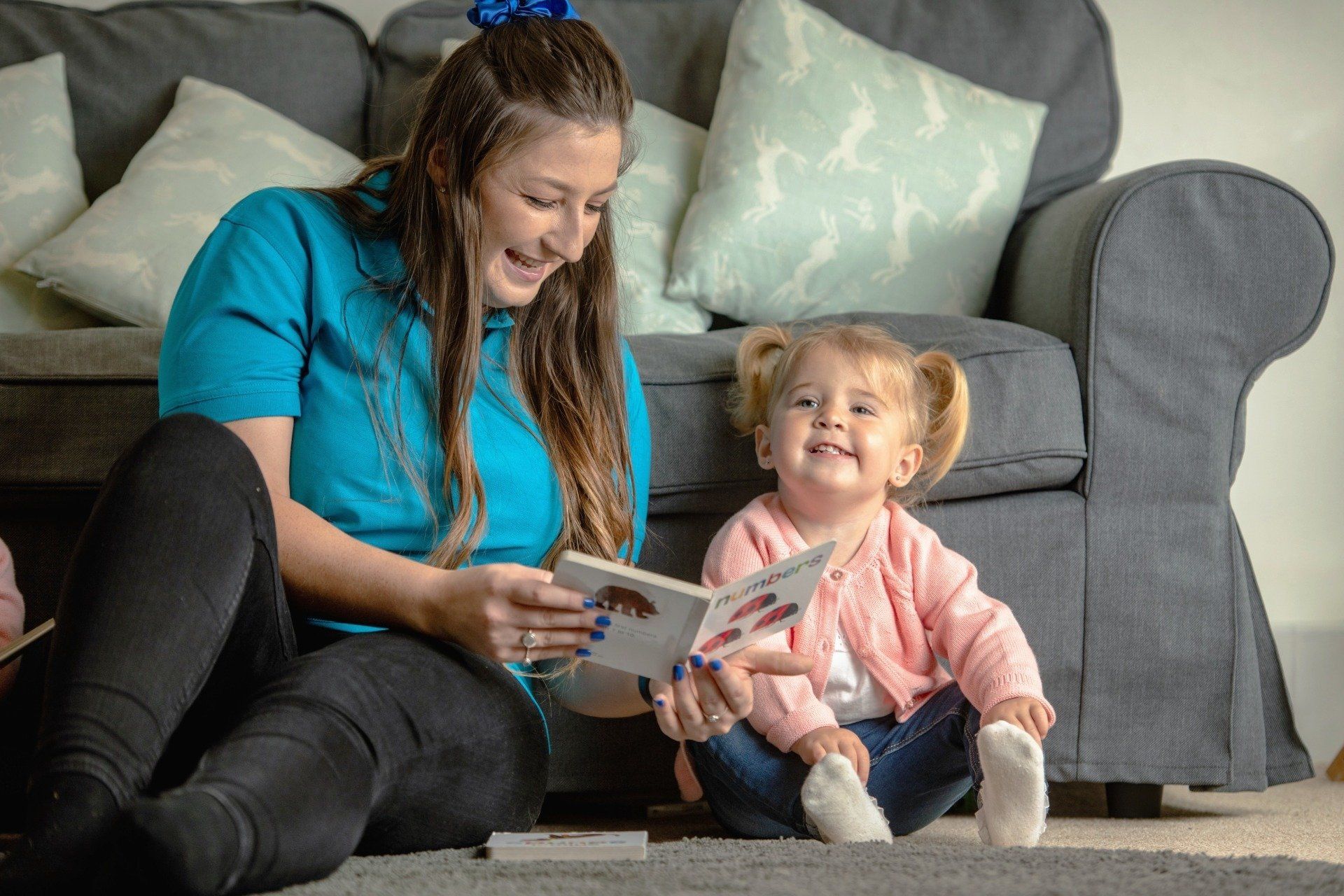
Personal, Social and Emotional Development -
Between the ages of 16 - 26 months we start to explore and play with new toys in new environments, engaging in pretend play. The children start to become more aware of others' feelings, for example, looking concerned if they hear crying or looks excited when they hear a happy voice.
Communication & Language -
Their communication starts to improve and they now understand simple sentences like 'throw the ball'. They will start to copy familiar expressions like 'oh dear' or 'all gone', and begin to put two words together like 'more please'. Their movement and handling skills start to increase, allowing them to crawl up the stairs or walk holding the hand of an adult.
Physical Development -
As your child gets older they will start to develop their own likes and dislikes in food and drink, intrigued to try new flavours and textures. As well as their interest in food, they start to become more aware of bladder and bowel urges, showing awareness of what a potty is used for.
Literacy -
At the age of 16 - 26 months your child will develop much more of an interest in books and rhymes, they might already have a favourite. At Country Kids Day Nursery we like to encourage children to link sounds and letters and begin to read and write. Reading books, poems and other written material to develop their interest.
Mathematics -
During this age group we start involving different games and activities that will develop their interest with numbers, shapes, space and measurements. They may start to say some counting words randomly or even begin to organise and categories objects into piles.
Understanding the World -
Between the ages of 16 - 26 months the children will start to explore objects by linking together different approaches; shaking, hitting, looking, feeling, tasting, mouthing, pulling, turning and poking. They will start to match different objects together, e.g putting a lid on a teapot. This means that the children start to have an understanding of the real world and their surroundings.
Expressive Arts & Design -
At this age the children start to move to music and listen or join in with different songs and rhythms, expressing themselves through action and sound. We start exploring the childrens imagination with the use of role play, pretending that one object represents another, especially when objects have characteristics in common.
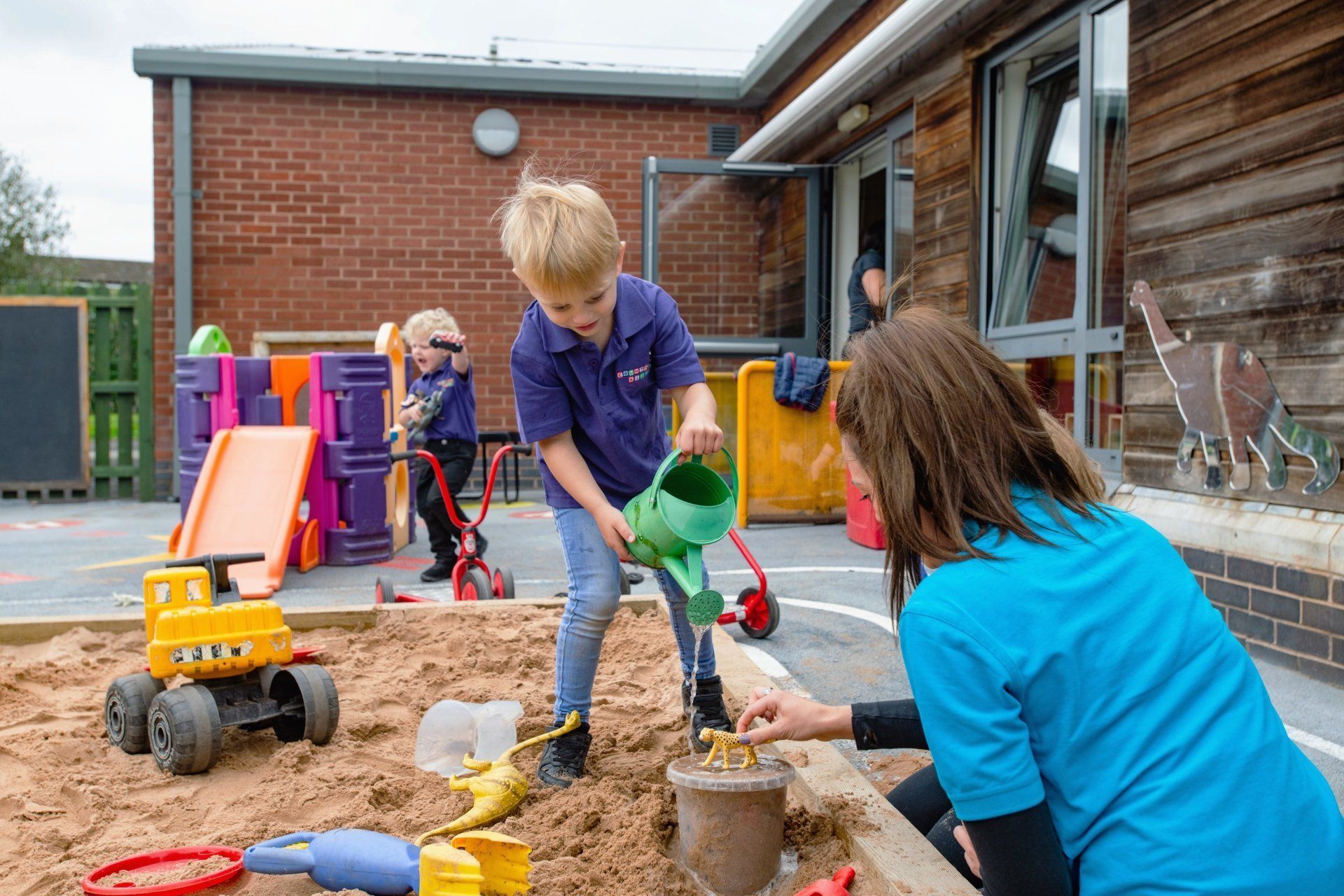
Personal, Social and Emotional Development -
At this stage of your childs development they will be coming on leaps and bounds. They will start expressing their own preferences and interests, seeking comfort from familiar adults when needed. As well as expressing their own prefereneces, you'll notice them starting to express their own feelings, such as happy, sad, cross, scared or worried. You'll also notice that their listening and attention will improve as they start to show understanding and cooperate with some boundaries and routines.
Communication & Language -
Between the age of 22 - 36 months your child will start to use language as a powerful mean of widening contact. They will begin sharing feelings, experiences and thoughts holding a conversation jumping from topic to topic. They begin to form new sentences and use a variety of questions too.
Physical Development -
As your child begins to develop even more they'll be able to hold drinks well without spilling, start to feed themself with a spoon on their own and clearly communicate their needs for the toilet. Your child will also start showing confidence when walking upstairs and downstairs holding onto a rail two feet to a step.
Literacy -
Their reading and concentration will start to improve, meaning that they'll be able to remember their favourite stories, songs or rhymes, filling in missing words or phrases during games.
Mathematics -
During this age range your child will start using their voices to ask for quantities, such as 'more' and 'alot'. They will also be able to select a small number of objects from a group when asked, e.g 'Please give me one'. Other things that we work on in their age group are recognising simple shapes and patterns in pictures, anticipating specific time-based events such as mealtimes or home time.
Understanding the World -
The way in which we start to familiarise the children with the outside world in this stage of their development is by letting them play with small world models, such as farm animals. The children also become more aware of technology and start to acquire the basic skills in turning on and operating IT equipment as well as operating mechanical toys, e.g. turning the knob on a wind up toy or pulling back on a friction car.
Expressive Arts & Design -
The children will start joining in singing their favourite songs, create sound by banging, shaking, tapping or blowing and begin to use representation to communicate, e.g. drawing a line and saying 'that's me'. This encourages the children to share their thoughts and feelings in ways they think best.
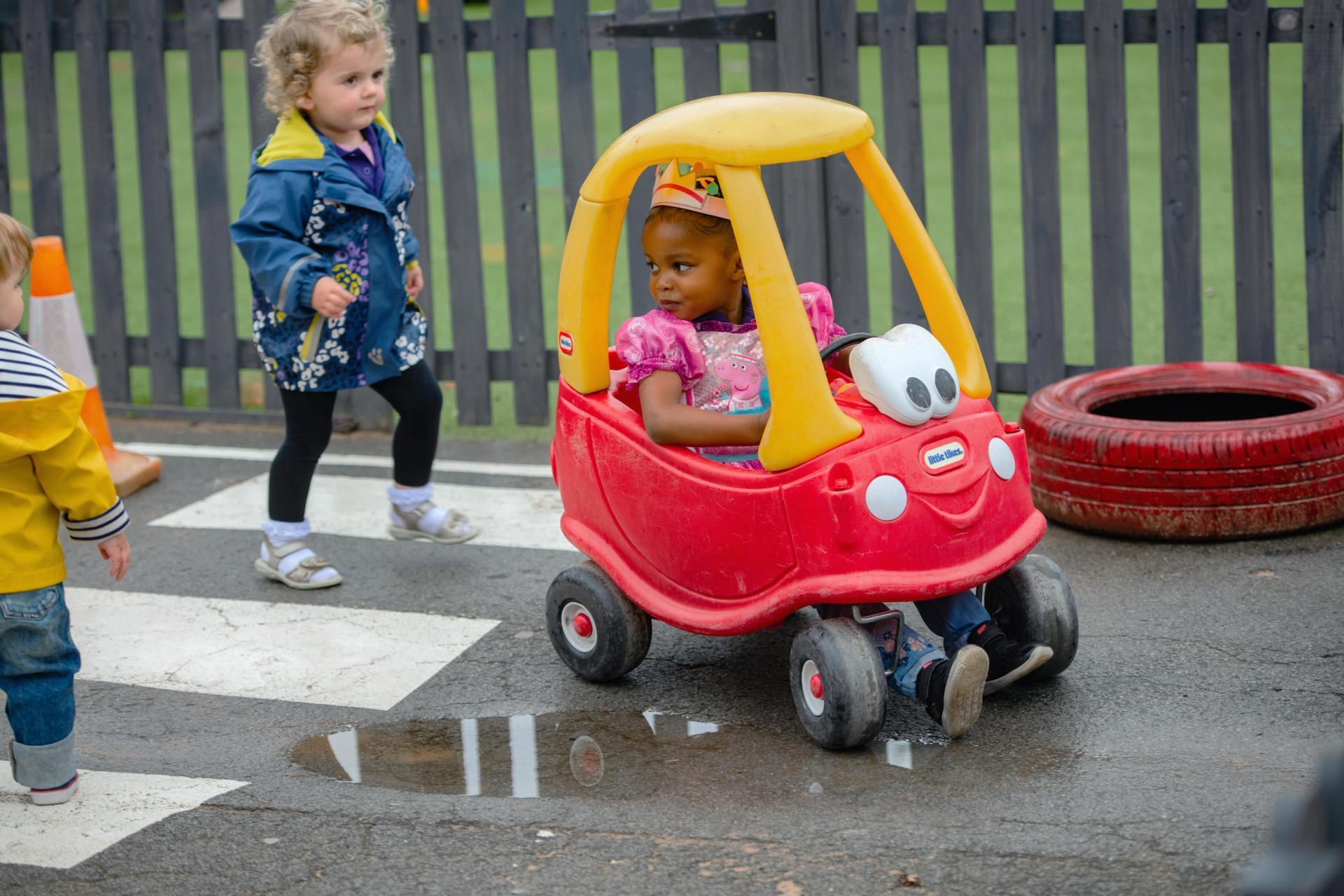
Personal, Social and Emotional Development -
During this stage of your childs development you will notice that they are becoming much more independent. They start selecting activities and rescourses with help from their key worker, enjoy carrying out simple activities and tasks, enjoying more responsibilty, as well as becoming more confident to talk to other children when playing. They start to become aware of feelings and how some actions and words can hurt others' feelings.
Communication & Language -
Between the age of 30 - 50 months the children start to respond to simple instructions, such as getting or putting away objects. They start to show understanding of prepositions such as under, on top and behind by carrying out and action or selecting the correct picture. They begin to question why things happen and start to give explanations. They may ask who, what, when and how.
Physical Development -
At this stage in their physical development your child will become more independent, being able to walk downstairs, two feet to each step whilst carring an object. They will start to begin telling you when they are hungry or tired, or whether they want to rest or play, as well as gaining more bladder and bowel control and begin to attend the toilet most of the time by themselves.
Literacy -
Your child will begin to show interest in books and illustrations, looking at books independently as well as with others. They will start to recognise familiar words and signs such as their own name or advertising logos. During this age range the children start to become more independent, expressing what they like and don't like.
Mathematics -
We begin to incorporate mathematics and literacy into our play at this age, the children learn to count to 10 and use their numbers during play, they begin to represent numbers using fingers, marks on paper or pictures. We also focus on shapes and patterns, the children start to show interest in shape and space by playing with shapes or making arrangements with objects.
Understanding the World -
The children start to become curious about their surroundings at this age, asking questions about aspects of their familiar worlds such as where they live or the natural world. You'll recognise that they start talking about some of the things they have seen such as plants, animals, natural and found objects. Their confidence with technology starts to improve and they now understand how to operate simple equipment like a CD Player, showing interest in things like cameras or mobile phones.
Expressive Arts & Design -
At the age of 30 - 50 months the children start to develop a preference for different forms of expression, using movements to express their feelings. In nursery we promote role-play activities, allowing them to capture experiences and responses with a range of media, such as music, dance and paint, as well as other materials or words.

Personal, Social and Emotional Development -
At the age of 5 the children really start to grow, they become confident to speak to others about their own needs, wants and interests and can describe themself in a positive way, talking about their own abilities. They maintain attention, concentrate and sit quietly during appropriate activity.
Communication & Language -
Their understanding and speaking at this age develops more and more each day, your child will begin to listen and respond to ideas expressed by others in conversation, use language to imagine and recreate roles and experiences in play situations and can extend their vocabulary especially by grouping and naming, exploring the meaning and sounds of new words.
Physical Development -
Your child will start to experiment with different ways of of moving, jumping on and off objects, playing racing and chasing games with other children. They will start to show a preference for a dominant hand, beginning to use anticlockwise movement and retrace vertical lines. Your child will start to understand the need for a variety of food and a balanced diet, showing some understanding that good practices with regards to exercise, eating, sleeping and hygiene can contribute to good health.
Literacy -
During these stages of their development your child will start writing their own name and other things such as labels and captions to pictures, links sounds to letters, naming and sounding the letters of the alphabet and enjoys an increasing range of books.
Mathematics -
As well as introducing literacy into the childrens development and education, we also incorporate mathematics too. As the children begin to use mathematical names for 'solid' 3D shapes and 'flat' 2D shapes, and mathematical terms to describe shapes.
Understanding the World -
At this age the children start looking closely at similarities, differences, patterns and change, as well as using ICT hardware to interact with age appropriate computer software.
Expressive Arts & Design -
During this stage of your childs development they begin to create simple representations of events, people and objects, initiating new combinations of movement and gesture in order to express and respond to feelings, ideas and experiences and introduces storyline or narrative into their play when role-playing.